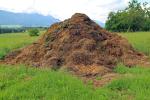Operational Group: Recovery and recycling of dried oil from olive mill ponds in olive grove soils. Agronomic and environmental benefits
- Type Operational group
- Status In progress
- Execution 2022 -2024
- Assigned Budget 289.231,00 €
- Scope Autonómico
- Autonomous community Andalucía
- Main source of financing CAP 2023-2027
The project is in line with various European initiatives, such as the European Biodiversity Strategy within the 2020 framework, which includes, as part of its Objective 3, the increase in the role of agriculture in maintaining and improving biodiversity, promoting, through the CAP, the application of sustainability measures in crops, and, among others, improving the organic matter content of soils as an indicator of improved soil quality. Another environmental concern in the agrosystem is the contamination of ecosystems due to the inappropriate and excessive use of agricultural inputs, a concern reflected in the "Farm to Fork" Strategy (COM/2020/381).
This project will demonstrate the allelopathic effect of applying organic agricultural amendments on weeds and the nutrient recycling that their incorporation into the soil entails, enabling the optimized use of herbicides and fertilizers. Furthermore, the project proposes the creation of an agricultural model that achieves net carbon sequestration in the soil through the application of organic amendments. This will not only mitigate emissions generated in the crop area, but may also lead to a farm achieving net negative emissions.
This characteristic allows us to move from a CO2-emitting model to one that acts as a climate change mitigator. In this sense, government initiatives following the Paris Agreement are moving toward reducing emissions in diverse sectors, such as agriculture, which, moreover, holds great potential, not only in terms of reducing emissions but also as a potential mitigator of carbon in the atmosphere.
The project's actions are aimed at evaluating the recycling possibilities of evaporated masses in the olive grove production system, assessing the fertilizing and limiting elements of their composition and their variability. To this end, six test fields have been established to monitor soil, tree, and production parameters. A study will also be conducted on the environmental impact of spreading dried masses on the soil, monitoring carbon sequestration, CO2 emissions, and biodiversity. A protocol for proper spreading and recommendations for agricultural use will also be developed.
Given the sustainability conditions currently required for agricultural activity and the pressure from administrations for the elimination or reduction of waste generated in the agro-industry, whose treatment is costly and risky for the environment, the project addresses a series of actions to convert the waste that represents the dried masses into a resource, valuing its properties as an agricultural amendment and through the evaluation of agronomic and environmental indicators, generating the necessary information that allows olive growers to use it as organic fertilizer and its regularization by the Administration.
- Coordinator/entity name: SUFECO, S.COOP.AND.
- Postal address: COMPOSITOR PACHELBEL, 7G AND 8G
- Coordinator/entity email: juanantoniocano@sufeco.es
- Telephone: 661278466
The need to consolidate agricultural activities and protect natural resources has led the Andalusian Regional Government to intervene in the adoption of various and far-reaching measures to improve the management of agroindustrial waste. Regarding waste derived from the oil production industry and its recycling in the agronomic phase, research conducted on the application of olive oil to the soil and the study of washing water for use as fertilizer irrigation led to regulations for its correct use in olive grove soils (Royal Decree 506/2013, on fertilizer products). BOE No. 164, ANNEX V Criteria applicable to fertilizer products made with waste and other organic components (Olive Oil); Order of February 18, 2011. Andalusian Regional Government (Washing Water), and even composting and marketing companies for the resulting compost were created. However, for this industry to fully manage and eliminate the waste it produces, it would be necessary to generate information validating the potential of the dried masses produced in the oil mills' wastewater dewatering ponds as a biowaste that improves soil and the environment, and to establish regulations that support its disposal. Furthermore, the information generated by the project could help the Administration establish common management regulations for all oil mills in the Autonomous Community, as individual management of this waste can be hampered by numerous factors (high costs, difficulty convincing managers to minimize their waste, etc.). Therefore, collective solutions appear to be the most appropriate and viable in many cases.
- SUFECO, S.COOP.AND.
- SUMINISTROS Y SERVICIOS DEL GRUPO FEDERADO S.C.A.
- COOPERATIVAS AGROALIMENTARIAS DE ANDALUCIA (cbascon@agroalimentarias-andalucia.coop fgomez@agroalimentarias-andalucia.coop)
- IFAPA Centro "Alameda del Obispo" (rafaelam.ordonez@juntadeandalucia.es)
- SUFECO, S.COOP.AND.





